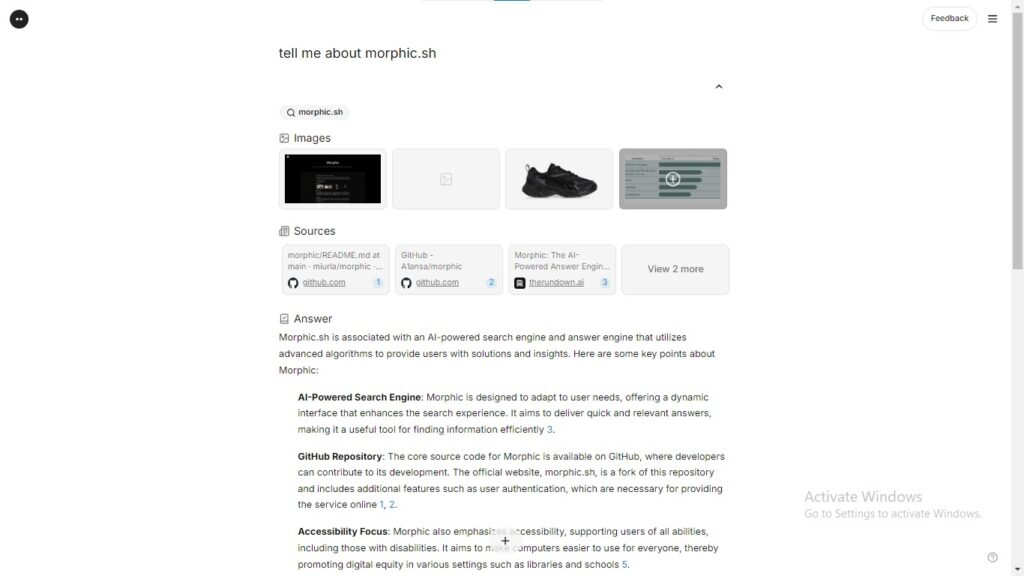Morphic: The AI-Powered Search Engine with a Generative UI
Morphic is a fully open-source AI search engine that reimagines how we interact with information online.
Description
Morphic is a fully open-source AI search engine that reimagines how we interact with information online. By combining a powerful search backend with a generative user interface, Morphic provides a more intuitive and conversational search experience.
Detailed description:
- Morphic utilizes a large language model (LLM) to understand natural language queries and provide relevant search results.
- Instead of traditional lists of links, Morphic generates a dynamic and interactive interface that summarizes key information and offers different perspectives on the topic.
- It allows users to refine their search through conversational prompts and follow-up questions.
- Morphic can access and process information from various sources, including websites, documents, and code repositories.
- It is designed to be transparent and customizable, allowing users to understand how the search results are generated and adjust the behavior of the AI.
Key features and functionalities:
- AI-powered search with natural language understanding
- Generative user interface for interactive exploration
- Conversational search refinement
- Multi-source information retrieval
- Open-source platform for transparency and customization
- Support for SearXNG as an alternative search backend
- Docker-based deployment for easy setup
Use cases and examples:
- Research and learning: Explore topics in depth, discover different perspectives, and gain a comprehensive understanding of complex subjects.
- Content creation: Gather information from various sources, summarize key findings, and generate new ideas.
- Problem-solving: Find solutions to problems by exploring different approaches and accessing relevant information.
- Code exploration: Search for code snippets, understand code functionality, and find solutions to coding challenges.
- Decision-making: Gather information and analyze different options to make informed decisions.
Examples:
- A student uses Morphic to research a historical event, exploring different perspectives and sources beyond traditional search results.
- A developer uses Morphic to find code examples and understand the functionality of a specific programming library.
User experience:
While Morphic focuses on providing an AI-powered search engine for code, its design and features suggest a user experience that prioritizes:
- Efficiency: Morphic allows developers to quickly find and reuse code snippets from various sources, including open-source repositories and personal codebases.
- Relevance: The platform uses AI to understand the context of search queries and provide relevant code examples, improving search accuracy and efficiency.
- Learning and Discovery: Morphic helps developers discover new coding techniques and solutions by providing access to a vast collection of code examples and best practices.
Pricing and plans:
Morphic is a fully open-source project and is free to use.
Users can contribute to the project by reporting issues, suggesting features, or submitting code improvements.
Competitors:
- Google Search: The dominant search engine with a vast index and powerful algorithms.
- Bing: Microsoft's search engine with a focus on visual search and integration with other Microsoft services.
- DuckDuckGo: A privacy-focused search engine with a clean interface and no tracking.
Morphic's unique selling points:
- AI-powered search with a generative user interface for a more interactive experience.
- Open-source platform for transparency and customization.
- Focus on natural language understanding and conversational search refinement.
- Ability to access and process information from various sources.
Last Words: Experience the future of search with Morphic! Visit website to explore its unique capabilities and contribute to the project.
